The Myerscough College Ag Net Zero Challenge, Fishwick Farms
Land management is amongst the largest contributors to climate change and there is an urgency for agriculture to transform from being a net emitter of carbon (CO2e) to a net sequester of carbon (CO2).
Carbon Farm Roadshow #2
Courtesy of martin and arlene fishwick and family
The Myerscough College Ag Net-Zero Challenge is part of The Lancashire Colleges’ Strategic Development Fun Pilot, supporting colleges and local employers to work together to create a skilled workforce for a future low-zero carbon economy.
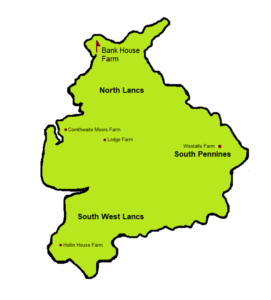
Farm Profile
Martin and Arlene Fishwick and family from Fishwick Farms near Silverdale in Lancashire, volunteered to participate in the Myerscough College Ag Net-Zero Challenge. They undertook a whole farm carbon audit, including a soil health assessment to identify areas of improvement within their farm business to reduce carbon emissions.
Bank house Farm
Extensive grazing system
Fishwick Farms
Silverdale
Silverdale
tHE CARBON AUDIT
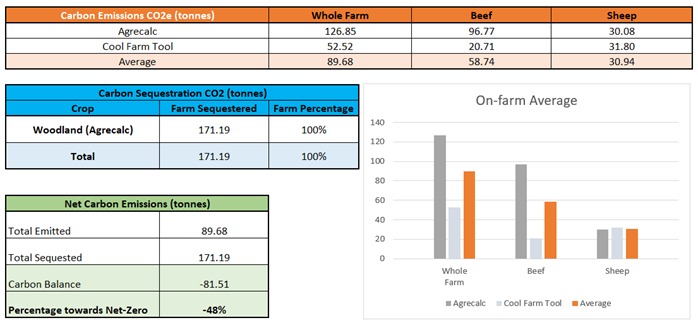
A carbon audit is an assessment of the emissions of carbon dioxide equivalents (CO2e) produced by each enterprise within a business and, where possible, looks at the sources of sequestration within the business. The carbon audit at Fishwick Farms was carried out by Carbon Metrics – a company that specialises in analysing and interpreting existing data and generating a targeted management plan to show how net-zero strategies can be achieved. The farm audit is calculated by using a carbon toolkit. There are currently over 70 toolkits available with no standard industry requirements for data. Therefore, in this case study, we used the average of two carbon audit calculators, Agrecalc and Cool Farm Tool, to produce the results.
Fishwick Farms emit 89.68T of CO2e, and their woodlands are sequestering 171.19T of CO2. The farm is a net sequester of CO2 from its farming activity, taking 81.51T of CO2e out of the atmosphere each year. Fishwick Farms is in a remarkable position. It helps show other farms that working towards (and indeed beyond) net-zero is possible.
Strengths
The farm has a good annual sequestration of 171.19T of CO2. The majority is from woodlands, resulting in the farm 49% past Net Zero.
Farming is relatively extensive with minimal degradation of pastures from livestock overgrazing enabling soil to retain robust nutrient profiles and prevent compaction issues across the farm.
The farm operates as a Net-Zero enterprise and can potentially benefit from verified carbon credits through the Woodland Carbon Code.
Areas for Consideration
Carrying out an annual measurement of soil organic matter will help verify the amount of soil carbon and build up in the soil.
Due to the farm’s current carbon surplus, the farm could grow the beef herd size to increase output across the farm and remain Net-Zero.
The farm could look to invest in renewables.
Focusing on fuel usage will reduce the farm’s carbon output.
Carbon Opportunities
The farm’s established livestock farming enterprise can grow with sustainable intensification through good diet management of the beef and sheep herd.
Finishing the cattle sold for meat in a shorter time frame requires additional bought-in feeds; however, feeding more in a shorter time will reduce beef emissions. Furthermore, any increases in emissions are offset within the farm’s current carbon surplus.
As a result, sustainable intensification can significantly reduce emissions while increasing outputs.
Benefits for the Business
By following the areas of consideration, the farm can expect an improved return on investment and a further fall in CO2e.
The farm is leading the way with carbon emissions. It shows how agriculture can generate new revenue sources by operating as a Net-Zero enterprise.
As opportunities around carbon credits and soil sequestration become monetised, the farm is in an enviable position to be at the forefront of these concepts and pilots, which should add value to the business and help open new areas of income as the industry transitions away from direct payments.
Soil Management
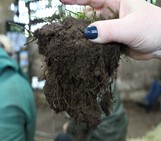
Good soil management significantly improves yields and nutrient distribution and using technology underpinned by nutrient management optimizes nutrient application rates and reduces fertiliser use.
Soil management is critical for all farmers. By breaking down 25-30% of the land each year for testing, can determine if there are any issues with compaction or nutrient uptake. Where on farm nutrient uptake is maximised so that artificial fertilizers are reduced farmers can reduce their carbon emissions and improve their profits.
The key to Fishwick Farm’s success is soil health. A soil profile at Bank House Farm determined a silty loam. Despite the weather, the structure was dry with great structure, lots of organic matter, and a plentiful supply of deep-rooted organic matter. There were no compaction issues.
Unlike temporary grass and arable land, Bank House Farm’s permanent pasture acts as a carbon store and does not sequester carbon. However, in the case of a soil cap (forming a hard surface crust in the top 1 to 10 mm of bare cultivated soils), the correct cultivation grass or soil aerator or subsoiler can support sequestration by increasing soil organic matter and improving soil nutrient uptake.
Improved productivity
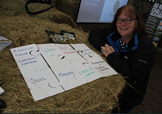
The results of the carbon audit were discussed with farmers from the wider farming community at the Myerscough College Ag Net-Zero Roadshow hosted by Martin and Arlene Fishwick at Bank House Farm.
Operational decision-making by Martin and Arlene includes simple decisions such as making hay as a winter forage instead of buying plastic wrap for silage. As LEAF farmers, Fishwick Farms is actively looking at sustainable farming to support the next generation. Importantly, most meat is sold directly to the public with feedback on quality received. Public money for public goods supports the red tractor standard, and carbon auditing supports our commitment to achieve a net-zero and the wider climate change agenda.
“Take one piece out then the whole farm approach falls apart. Farming is about the people… the whole team!” Arlene Fishwick
“Good management should be part of the whole farm approach and we shouldn’t need to have to feel rewarded for it.” Martin Fishwick
Subscribe!
Please enter your email below to keep up-to-date with the AG Net-Zero Challenge
